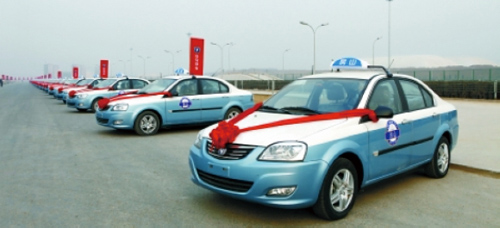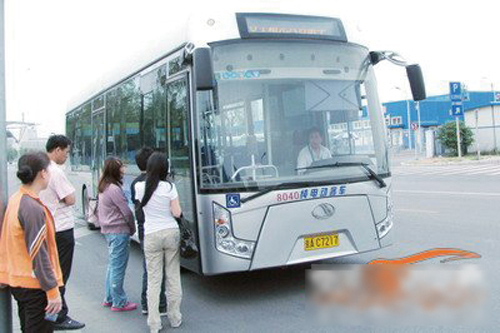New Energy Vehicle Plan to Drive China to Lead EV Market by 2020
2012/04/05 | By Michelle HsuAfter opening up China to global carmakers which have driven the nation past even the U.S. to lead annual new car sales worldwide since a few years ago, the Beijing government, struggling with worsening air pollution, traffic gridlock, has been working on ways to adjust automotive industrial policy and emphasize quality rather than just quantity. Electric vehicle (EV), hybrids and other new energy cars are among those for priority development under the New Energy Vehicle (NEV) Program that the Beijing government announced as the means to tackle worsening air pollution on one hand and re-steer the development of the automotive industry toward higher technology level on the other hand.
Under the NEV Program, China aims to become the largest EV market by 2020, with annual sales of over 5 million vehicles, which can only be achieved by selling an annual average of 500,000 battery vehicles and plug-in hybrids along with 1.5 million conventional hybrids between 2011 and 2020.
Strategically Important
Mr. Shomik Mehndiratta says in his report published by the World Bank last year, “Vehicle electrification is strategically important to China’s future in the following four areas: global climate change; energy security; urban air quality; and China’s auto industry growth.”

The “10 Cities, 1,000 EVs” plan that China announced in 2009 was the first subsidy program for the emerging EV industry, after which a series of other measures were implemented in the following years. While the number of subsidized cities increased from the original ten to 25 in 2010, the government has added other incentives and subsidy items, which enhance infrastructural construction, investment, technology development, and EV manufacturing capacity. Last year, Beijing confirmed the plan to invest RMB100 billion in new energy vehicles over the 10 years (2011-2020), during which a balanced approach is emphasized to stimulate demand and supply simultaneously.
As Mehndiratta said, “Significant electric vehicle (EV) technology development in China is occurring in industry as well as universities, focusing primarily on batteries and charging technology. The new EV value chain is beginning to develop new businesses and business models to provide the infrastructure, component, vehicle, and related services necessary to enable an EV ecosystem.”
New Incentives
Last year, the Ministry of Industry and Information Technology (MIIT) worked out the details to use the RMB100 billion budget initiated in 2010 to finance EV industry promotion in China. Around 50%, or RMB 50 billion, is earmarked for technological research and development, leaving the rest balance for various incentives, awards, subsidies for either consumers or suppliers. The purchase subsidy is a maximum of RMB 50,000 for a plug-in hybrid electric vehicle (PHEV) or RMB 60,000 for a battery electric vehicle (BEV), depending on energy efficiency.
Since last June, Shanghai, Changchun, Shengzhen, Hanzhou and Hefei have announced several incentives as part of their EV trial projects for urban transportation, with Shanghai the first to waive license fee for the new-energy cars.
The government will also subsidize EV makers with annual production of 50,000 cars or more, available to local brands or joint ventures where Chinese partners control 51%-or-higher stake. Meanwhile, the government has also worked out detailed regulations to encourage carmakers to price EVs “affordably” to stimulate purchase willingness. For example, a 2012 gasoline-powered Ford Focus is about US$20,000, but the Focus Electric is US$32,500 with a federal rebate.
EV Production
The NEV Program in general earned positive feedback from carmakers, one after another has announced EV development plans for the next decade. At the 9th China (Guangzhou) International Automobile Exhibition held Nov. 22-28, 2011, there were 53 new energy vehicles among which 13 were introduced by Chinese makers.
In February this year, Changan Automobile delivered 10,000 E30 EVs to the Beijing Government for trial run, passing of which will enable these vehicles to be used in city government fleets, public transport, or for rent to private users. The Beijing government aims to raise the number of EVs in use within the city to over 5,000 by the end of this year.
Southeast Motor, a subsidiary of China Motor under Taiwan’s Yulon Group, has been licensed by the MIIT to produce pure battery-powered Delica trucks for the Fujian Provincial Government to be used as provincial transportation. The truck is the second EV made by joint efforts between Taiwan and China, following the Luxgen launched also by Yulon Motors. Southeast Motor is a joint venture of three major shareholders—Taiwan-based China Motor, Japan-based Mitsubishi, and a local partner in Fujian Province.

Anhui Jianghuai Automobile, a top-10 carmaker in China, also plans to partner with Taiwanese operators for its EV program, having last year contacted several Taiwanese battery makers. Jianghuai Automobile started engaging in EV R&D 10 years ago and finally launched its first EV last year, targeting annual sales of 1,000 hybrids and 300 electric buses this year. To support its expanding EV production, the company is looking for battery and key parts suppliers from Taiwan where a full EV supply chain has been developed.




